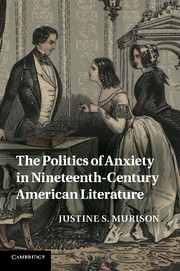Book contents
- Frontmatter
- Contents
- Acknowledgments
- Introduction
- 1 A bond-slave to the mind: sympathy and hypochondria in Robert Montgomery Bird's Sheppard Lee
- 2 Frogs, dogs, and mobs: reflex and democracy in Edgar Allan Poe's satires
- 3 Invasions of privacy: clairvoyance and utopian failure in antebellum romance
- 4 “All that is enthusiastic”: revival and reform in Harriet Beecher Stowe's Dred
- 5 Cui bono?: spiritualism and empiricism from the Civil War to American Nervousness
- Epilogue: the confidences of anxiety
- Notes
- Index
- CAMBRIDGE STUDIES IN AMERICAN LITERATURE AND CULTURE
Introduction
Published online by Cambridge University Press: 01 June 2011
- Frontmatter
- Contents
- Acknowledgments
- Introduction
- 1 A bond-slave to the mind: sympathy and hypochondria in Robert Montgomery Bird's Sheppard Lee
- 2 Frogs, dogs, and mobs: reflex and democracy in Edgar Allan Poe's satires
- 3 Invasions of privacy: clairvoyance and utopian failure in antebellum romance
- 4 “All that is enthusiastic”: revival and reform in Harriet Beecher Stowe's Dred
- 5 Cui bono?: spiritualism and empiricism from the Civil War to American Nervousness
- Epilogue: the confidences of anxiety
- Notes
- Index
- CAMBRIDGE STUDIES IN AMERICAN LITERATURE AND CULTURE
Summary
“I think anxiety is very interesting,” observed Amy, eating sugar, pensively.
Louisa May Alcott, Little Women (1868)This book refocuses the study of nineteenth-century American literature on frogs shorn of their heads, tables that report on the afterlife, and men who think they are teapots. These instances constitute more than a “curiosity cabinet” of outré psychology or outright fraud; rather, the nineteenth-century understanding of the nervous system united them as possible, even plausible, sources for psychological insights. Many crucial discoveries about the nervous system predate 1820, but not until then did nerves come to shape the representations and experiences of cultural, political, and religious tumults in the United States. By the 1830s and through the rest of the century, writers absorbed, expressed, and popularized the medical language of the nerves. In turn, their narratives of nervousness swayed debates about the biological and cultural meanings of “freedom” and “possession,” subjects to which all of the writers in this study return. “Free society” was understood to be nervous; that is, it was open, vulnerable, and fraught with the power to derail reform while also dependent upon an active, participatory body politic, a paradox not lost on political and social commentators before and after the Civil War. “Why,” George Fitzhugh, pro-slavery author of Sociology for the South (1854) and Cannibals All! Or, Slaves Without Masters (1857), asks, “have you Bloomer's and Women's Rights men, and strong-minded women, and Mormons, and anti-renters, and ‘vote myself a farm’ men, Millerites, and Spiritual Rappers, and Shakers, and Widow Wakemanites, and Agrarians, and Grahamites, and a thousand other superstitious and infidel Isms at the North?
- Type
- Chapter
- Information
- Publisher: Cambridge University PressPrint publication year: 2011

